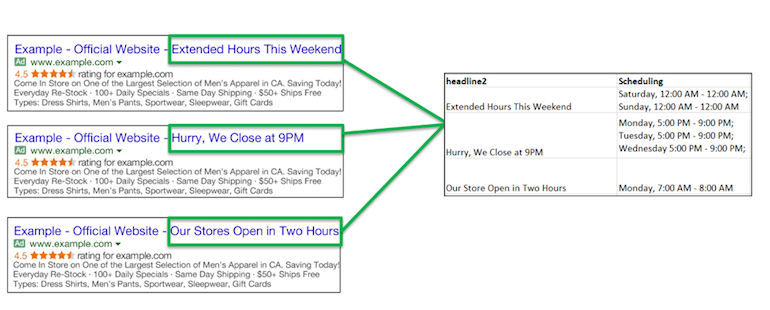Learn more from Sergio live at Hero Conf Austin, April 16-18.
The PPC game only gets more challenging as time goes by. Each year, it becomes exponentially more difficult to gain an edge on your competition.
To maintain your lead, you need to deploy strategies your competitors don’t even have on their radars. Do that and you’ll get them scratching their heads, wondering what your secret is.
Ready to add some new tools to your arsenal? Here are three of my favorite SEM tricks you should try.
1. Ad Customizers
Ad customizers are a powerful tool for advertisers to give near-real-time context to their ads. It is user defined instructions in a data feed that adapts ads in real-time based on what our audiences (who) are searching for (keywords), where they are searching from (locations), what type of device they are using to search, and when they are searching (time of day/day of week). Here I will emphasis the time people are searching from.
Some of you are thinking of a countdown timer (which is an ad customizer, by the way), but what if you wanted to target a message to a specific hour or minute? The countdown timer can’t do that. This is where ad customizers come into play.
Here’s an example of ad customizers in what the feed might look like. Remember to specify the data type in the headers.

Headline 2: {=daymessaging.headline2:Exclusive In Store Deals}
2. Broad Keywords with A LOT of Negatives
You probably have a love-hate relationship with broad keywords, but they’re a cool hack if you can get them to work exactly how you want. Here’s one of the many ways to use them.
- Pick a few of your high-converting keywords.
- Make sure there are campaign-level negatives of the Exact and Phrase matches for those keywords (ad group-level negatives aren’t enough—trust me).
- You can also add a bunch of other negatives that garner lower-converting traffic (copy that list into this new campaign as well).
- Examine which new search terms are triggering your ads. You might find some cool new synonyms around your current keyword list that you can build into your other campaigns.
- Continue to filter irrelevant core keywords (maybe with some n-gram analysis?).
- Cheers—you got search engines to do ongoing keyword research for you!

3. Dynamic Search Ads + Remarketing Lists
This strategy is for those of you who are new to Dynamic Search Ads. It can complement existing efforts, and it should be on anyone’s list of tests to try.
The Dynamic Search Ad is available on both AdWords and Bing. Essentially, it tells a search engine to crawl a website and match search terms related to the website’s content. The ad’s headlines are then dynamically generated to match the terms users search for based off of the landing page used.
If you layer on remarketing lists—especially if you have a content-rich website or a blog about your product or services—you can extend beyond your standard keyword list to get users back to your website. With a page built around frequent search terms, you can “follow” users on Google or Bing without doing the heavy lifting on figuring out which keywords to buy.

Everyone’s business is different, so your results may vary. Still, try these three strategies if you’re looking for new ideas. They may be just what you need to get a leg up on the competition.



